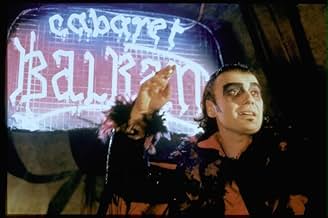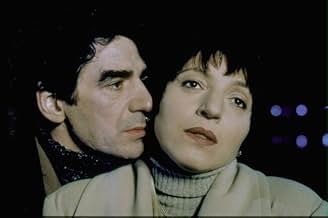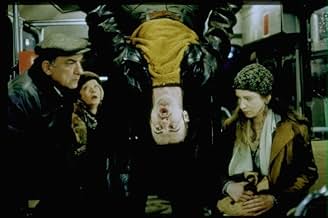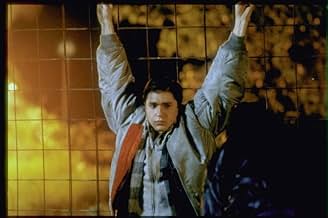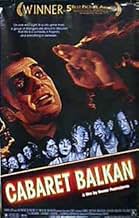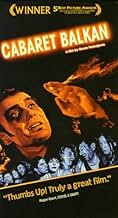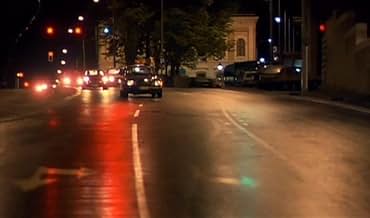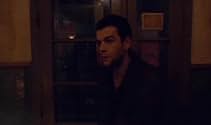CALIFICACIÓN DE IMDb
7.7/10
5.9 k
TU CALIFICACIÓN
Agrega una trama en tu idiomaRandom Belgrade citizens interact with each other in a night full of crime, frustration, betrayal and revenge.Random Belgrade citizens interact with each other in a night full of crime, frustration, betrayal and revenge.Random Belgrade citizens interact with each other in a night full of crime, frustration, betrayal and revenge.
- Dirección
- Guionistas
- Elenco
- Premios
- 8 premios ganados y 4 nominaciones en total
Vojislav 'Voja' Brajovic
- Topi
- (as Vojislav Brajovic)
Predrag 'Miki' Manojlovic
- Mane
- (as Predrag-Miki Manojlovic)
Opiniones destacadas
10ereinion
Goran Paskaljevic outdoes himself with this dark, satiric drama-comedy. What he gives us here is Serbia in a nutshell, a post-war Serbia torn with crime, anger and mistrust. "Who's to blame?" is the central question here and the line is spoken several times throughout the movie, once in a particularly hilarious scene. The bus scene is the one that illustrates the situation Serbia and most of former Yugoslavia are in-chaos. There is no one behind the wheel, so everybody is trying to take control.
There is no way to write about this film without saying something about the cast. It consists of all the finest Serbian and Yugoslav actors (two of them, Trifunovic and Glogovac, are from Herzegovina originally and two are from Macedonia) and it is one of the cases where the entire cast is the protagonist. Particularly fine performances come from Miki Manojlovic, Mirjana Jokovic, Mirjana Karanovic, Voja Brajovic, Aleksandar Bercek, Nebojsa Glogovac and Lazar Ristovski. The storyline is incredibly well built and all stories and characters are equally good.
This is a flawless, high quality tragicomedy which will provide you great entertainment and watching experience, as well as a good insight into the situation of this country. It is a humanistic and poignant film with a message, a cry for help. Balkan-a barrell of gunpowder, a-hole of the world.
There is no way to write about this film without saying something about the cast. It consists of all the finest Serbian and Yugoslav actors (two of them, Trifunovic and Glogovac, are from Herzegovina originally and two are from Macedonia) and it is one of the cases where the entire cast is the protagonist. Particularly fine performances come from Miki Manojlovic, Mirjana Jokovic, Mirjana Karanovic, Voja Brajovic, Aleksandar Bercek, Nebojsa Glogovac and Lazar Ristovski. The storyline is incredibly well built and all stories and characters are equally good.
This is a flawless, high quality tragicomedy which will provide you great entertainment and watching experience, as well as a good insight into the situation of this country. It is a humanistic and poignant film with a message, a cry for help. Balkan-a barrell of gunpowder, a-hole of the world.
As truth can be defined by the observer, it is also guided by the artist. This film is as close to truth in film as one can get. The state of the Balkans is one which cannot be easily defined, but understood, if you understand its peoples. The truth of this film lies in the reactionary maelstrom that has been the Balkans for a very, very long time. The film ties the lives together of many, equally bizarre characters and events which are tied together artistically by a collage of madness and life on the edge of it. Please do not miss this film, and watch it several times if possible.
10Zambelli
If you know at least something about the events that took place in former Yugoslavia during the 1990s, you should be able to understand this movie.
Many people have misinterpreted this movie as a vicious depictment of some sick Serbian mentality or an exaggerated vision of a post-war Serbia. None of this is true. The theme of "Cabaret Balkan" is not violence. A great parallel can be made between "Cabaret Balkan" and "A Clockwork Orange". The violence in both movies is not the theme - it's merely an extreme way of proving an important point.
The oppressors and the oppressed. The small fish and the big fish. The dogs and the sheep (rock fans might find interesting similarities between this movie and Pink Floyd's "Animals"). There seems to be certain hierarchy present in "Cabaret Balkan". The passive majority is constantly oppressed by the violent minority, many of whom themselves are victims of "bigger fish". The passive majority is always ready to turn a blind eye, to look the other way or, as a scene from the movie so visually illustrates, sit on a different side of the bus.
Who should the war be blamed on? Is it the government's fault? Or is the fault of the people who elected the government? Should the criminals in power take the blame or the people who let them stay in power? A key scene of the movie which takes place in the bus seems to tell us the most about this issue. "You finally stood up to me", says the young bully to the old man who refuses to play along and answer his insulting questions. In a way, the young bully on the bus is the only real hero of "Cabaret Balkan". He is the only one with the guts to stand up for his rights - everyone else would much rather look the other way, ignore the situation and mind their own business.
The original title of the movie - "Powder Keg", draws its name from an old nickname the Balkan peninsula earned at the beginning of this century - a powder keg ready to explode, with multitudes of people constantly fighting wars, making up, then fighting again. After all, isn't that what all the characters in the movie do? The strange mentality of the Balkan people cannot be easily explained, so director Paskaljevic takes it into extremes and creates extremely surreal scenes, like the one in the boxing ring and the bar. Fight. Drink. Fight. Drink. War. Peace. War. Peace. What's it going to be? Doesn't matter, as long as we're all in "good health".
Many people have misinterpreted this movie as a vicious depictment of some sick Serbian mentality or an exaggerated vision of a post-war Serbia. None of this is true. The theme of "Cabaret Balkan" is not violence. A great parallel can be made between "Cabaret Balkan" and "A Clockwork Orange". The violence in both movies is not the theme - it's merely an extreme way of proving an important point.
The oppressors and the oppressed. The small fish and the big fish. The dogs and the sheep (rock fans might find interesting similarities between this movie and Pink Floyd's "Animals"). There seems to be certain hierarchy present in "Cabaret Balkan". The passive majority is constantly oppressed by the violent minority, many of whom themselves are victims of "bigger fish". The passive majority is always ready to turn a blind eye, to look the other way or, as a scene from the movie so visually illustrates, sit on a different side of the bus.
Who should the war be blamed on? Is it the government's fault? Or is the fault of the people who elected the government? Should the criminals in power take the blame or the people who let them stay in power? A key scene of the movie which takes place in the bus seems to tell us the most about this issue. "You finally stood up to me", says the young bully to the old man who refuses to play along and answer his insulting questions. In a way, the young bully on the bus is the only real hero of "Cabaret Balkan". He is the only one with the guts to stand up for his rights - everyone else would much rather look the other way, ignore the situation and mind their own business.
The original title of the movie - "Powder Keg", draws its name from an old nickname the Balkan peninsula earned at the beginning of this century - a powder keg ready to explode, with multitudes of people constantly fighting wars, making up, then fighting again. After all, isn't that what all the characters in the movie do? The strange mentality of the Balkan people cannot be easily explained, so director Paskaljevic takes it into extremes and creates extremely surreal scenes, like the one in the boxing ring and the bar. Fight. Drink. Fight. Drink. War. Peace. War. Peace. What's it going to be? Doesn't matter, as long as we're all in "good health".
8=G=
"Cabaret Balkan" comes at you like fangs on a snapping Doberman with is finely tuned and well crafted display of anger. An apparent cry of despair for the current social, economic, and political state of the Balkans, an open and festering wound on the face of the world, "Cabaret Balkan" actually shows little violence and almost no gore. What is does show is nonstop rage. A "Magnolia-esque" format with numerous characters in unrelated situations in lieu of a homogenous story, "Cabaret Balkan" trades plot for purpose and substance for effect. However, its sheer drama, the power of its performances, and the superb acting by a relatively unknown cast make this film pound-for-pound and dollar-for-dollar more powerful, gripping, and compelling than anything to come out of Hollywood in recent years.
In one night the 1990s, in Beograd, many violent acts happen almost simultaneously, having as a `touching point' linking all of them the presence of a cab driver. A car crash, a vengeance against a former policeman, a harsh dialog between two boxers friends, a paranoid man in a bus, the anger of a lover against the former passion of his mate, the jealousy of a boy friend, all of these feelings are the motive for an outburst of violence from locals. The Brazilian title (`Powder Keg') metaphorically defines the state-of-mind of the civilian population, ready to explode in a city without law in times of war. I liked the screenplay, the direction and performance of the cast of this low budget movie. However, living in Rio de Janeiro, this black humor theme does not surprise me. My vote is eight.
Title (Brazil): `Barril de Pólvora' (`Powder Keg')
Title (Brazil): `Barril de Pólvora' (`Powder Keg')
¿Sabías que…?
- TriviaFilmed entirely at night.
- Bandas sonorasFanfare / Duvacki
Orkestar 'Oluja' Sinisa Stankovica
Selecciones populares
Inicia sesión para calificar y agrega a la lista de videos para obtener recomendaciones personalizadas
- How long is Cabaret Balkan?Con tecnología de Alexa
Detalles
- Fecha de lanzamiento
- Países de origen
- Sitio oficial
- Idioma
- También se conoce como
- Cabaret Balkan
- Locaciones de filmación
- Productoras
- Ver más créditos de la compañía en IMDbPro
Taquilla
- Total en EE. UU. y Canadá
- USD 108,103
- Fin de semana de estreno en EE. UU. y Canadá
- USD 11,774
- 25 jul 1999
- Tiempo de ejecución1 hora 42 minutos
- Color
- Mezcla de sonido
- Relación de aspecto
- 1.85 : 1
Contribuir a esta página
Sugiere una edición o agrega el contenido que falta

Principales brechas de datos
By what name was Bure baruta (1998) officially released in India in English?
Responda
